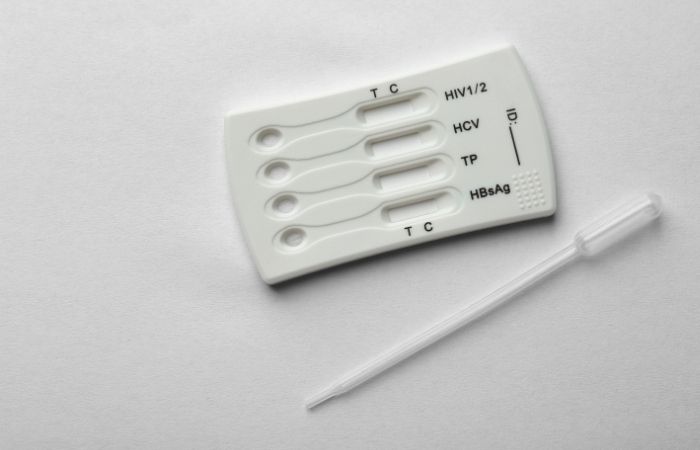No Symptoms, No Problem? Why You Still Might Need an STD Test
Quick Answer: Delaware's STD rates are rising due to missed symptoms, lack of access to testing, and shame, especially in rural and teen populations. At-home STD test kits offer a discreet, accurate way to take control and stop the spread.
“I Wasn’t Sleeping Around. I Still Got Gonorrhea.”
Tasha, 24, from Dover, thought she was being safe. She used protection, got tested once during college, and didn’t have a “high number” of partners. But when she started noticing a burning sensation after sex and mild spotting, she assumed it was a yeast infection, until it wasn’t.
“My doctor told me I’d had gonorrhea for months. I was mortified. Not because I got it, but because I could’ve passed it to someone else and didn’t even know.”
Like Tasha, thousands of Delawareans are learning the hard way: STDs don’t care about your relationship status, how often you test, or whether you “seem” symptomatic. And for too many, the system makes it easy to fall through the cracks. This isn’t just about risky behavior. It’s about visibility, access, and deeply ingrained stigma.
Here’s why experts say Delaware’s STD numbers keep rising:
- 1. Asymptomatic Infections: Up to 80% of chlamydia and gonorrhea cases show no symptoms, especially in people with vaginas. Many carry and spread the infection without realizing it.
- 2. Clinic Deserts in Rural Counties: In Sussex and Kent counties, access to free or low-cost testing is limited. Some residents would need to drive over 45 minutes to the nearest confidential testing site.
- 3. Rising Rates Among Teens & Young Adults: Delaware teens aged 15–24 account for the majority of new STD cases, particularly syphilis and gonorrhea. Sex ed in many districts remains abstinence-focused, leaving young people unprepared.
- 4. Post-Pandemic Delays: COVID disrupted routine care. Many skipped annual exams, stopped testing after hookups, or feared clinic visits due to virus exposure.
And let’s be real, stigma still lingers. In tight-knit communities, the fear of being seen walking into a clinic can be enough to stop someone from ever getting tested.

People are also looking for: He Didn’t Tell Me He Had Herpes, What Happened Next
STD Symptoms You Might Be Ignoring
Some STDs are sneaky. Others mimic harmless issues like UTIs, yeast infections, or even razor burn. If you’re in Delaware and wondering whether you should get tested, here are some signs to watch for:
- Burning or itching after sex
- Unusual discharge (clear, yellow, or green)
- Pain during urination
- Sores, bumps, or blisters in the genital or oral area
- Bleeding between periods
- Testicle or pelvic pain
But here's the twist: Many people have no symptoms at all. That’s especially true for chlamydia, HPV, and early-stage HIV. Waiting for a sign can mean waiting too long.
You Don’t Have to Go to a Clinic to Get Tested
One of the biggest game-changers for Delawareans? The rise of at-home STD test kits. You can now test for the most common STDs, including chlamydia, gonorrhea, and HIV, without stepping foot in a clinic. It’s private, accurate, and fast.
Whether you’re in Wilmington, Rehoboth, or anywhere in between, discreet shipping and easy instructions make home testing an ideal option, especially if:
- You’re between doctors or uninsured
- You live in a town where testing feels too public
- You’ve had a new partner, even if you used protection
- You’re just not sure, and it’s keeping you up at night
Chlamydia, Gonorrhea & Syphilis At-Home STD Test Kit is a popular option, covering multiple infections with one sample and results in minutes. Peace of mind is one test away. You don’t need permission or symptoms to take care of your body.
This Isn’t Just About Sex, It’s About Silence
In Delaware, silence is one of the most dangerous symptoms of all. When people don’t talk about testing, risk, or protection, infections spread faster. And for many communities, especially LGBTQ+ folks, teens, and people of color, the silence isn’t a choice. It’s survival.
Malik, 19, a college freshman in Newark, said he skipped getting tested after his first hookup because he didn’t want to be seen at the campus health center.
“I wasn’t out yet. I couldn’t risk people knowing. But then I got this weird discharge and had to explain everything to a clinic nurse. I felt exposed.”
Malik had gonorrhea. He got treated, but the shame stuck. “I wish I knew about at-home tests,” he added. “I would've done it in my dorm, no questions asked.”
Stigma in Small Towns: A Delaware Problem With National Roots
Let’s talk geography. Delaware may be small, but rural areas like Seaford, Smyrna, and Georgetown carry a heavy burden. When local clinics are hours away or school nurses don’t offer resources, many simply don’t test.
Plus, the fear of “who’s going to find out?” hits harder in places where everybody knows everybody. A recent study in rural Appalachia (which shares stigma patterns with parts of rural Delaware) found that teens were 40% less likely to get tested due to fear of community judgment, even when symptoms were present.
That’s where discreet solutions can fill the gap.
Myth Check: “If I Had an STD, I’d Know It”
This one’s dangerous. Most people assume they’d “feel it” if something were wrong. But here’s the truth:
- Chlamydia: 70–90% of cases in people with vaginas show no symptoms at all
- HPV: Often invisible until it causes genital warts or abnormal Pap results
- Syphilis: Early signs may look like ingrown hairs or minor skin irritation
- Herpes: Can be completely silent between outbreaks, yet still spread
Waiting for symptoms is like waiting for a fire alarm that doesn’t always go off. Testing regularly, especially after a new partner, is the only way to know your status.

People are also looking for: Can You Get Chlamydia in Your Throat? Yes, Here’s What It Feels Like
Take Control Without Leaving the House
At-home STD testing isn’t just convenient. It’s revolutionary for people who’ve been excluded from traditional care. You don’t have to explain your sex life to a stranger. You don’t have to rearrange your work schedule. You don’t even have to panic alone at 2AM while Googling “burning after sex but no STD?”
Here’s how easy it can be:
- Step 1: Choose the right test
- Step 2: Receive the kit discreetly by mail
- Step 3: Collect your sample in private
- Step 4: Get results in minutes, no waiting rooms, no judgment
These tests are medically approved, fast, and surprisingly affordable. For many in Delaware, it’s the first time testing has felt possible, on their terms.
What If You’re Positive?
Testing is step one. If your result comes back positive, here’s what to do:
- Don’t panic: Most STDs are curable or manageable
- Get treated: Clinics, telehealth services, and primary care doctors in Delaware can provide meds
- Tell your partner(s): It’s hard, but it’s necessary. If you need help, services like TellYourPartner.org can send anonymous texts
- Retest: Follow up after treatment to make sure it’s gone, especially with chlamydia and gonorrhea
Remember: A positive test isn’t the end. It’s the beginning of getting better, clearer, and safer, for you and your community.
“I Got an STD from My First Partner, and No One Taught Me What to Look For”
Jules, 17, from Milford, had only had sex once when she started experiencing pelvic cramps and a weird smell. She didn’t know who to talk to, her school nurse wasn’t trained in sexual health, and her parents weren’t open about sex.
“I thought it was a UTI. My best friend told me to drink cranberry juice and it would go away. It didn’t. I finally looked it up and saw something about chlamydia. That’s when I panicked.”
Jules tested positive for chlamydia. Luckily, she caught it early, but it could’ve done serious damage to her reproductive system if left untreated. “No one tells girls like me what to watch for,” she said. “We’re just expected to know.”
Delaware’s Teen STD Rates Are Alarming, and Underreported
Delaware ranks consistently among the top 15 U.S. states for teen STD rates. In 2023 alone, over 6,000 chlamydia and gonorrhea cases were reported among people aged 15–24. Experts say the real number is much higher, because many go untested or unreported.
Why are young people so vulnerable?
- Shame: Teens fear judgment from adults and peers
- Gaps in sex education: Delaware allows abstinence-based programs that may skip over testing info
- Confusion: Many mistake symptoms for common infections (UTIs, yeast)
- Access: Not all minors know their rights to confidential testing
Here’s the truth: Teens can consent to STD testing in Delaware without parental permission. And now, they can also test from home.
Talking to Partners in a High-Risk State
Having the “testing talk” isn’t just for new relationships. In a state where STD rates are rising fast, routine conversations about status, protection, and symptoms are a form of care, not paranoia.
Need help getting started? Try one of these scripts:
- Before sex: “Hey, I always test between partners. When was your last check?”
- After symptoms show up: “I’ve noticed something off and want to get tested. Want to test too?”
- If you test positive: “I need to tell you something so you can take care of yourself too…”
If your partner shames or avoids the conversation? That’s a red flag, not a reason to skip testing. Protecting your health should never feel negotiable.
From Fear to Freedom: The Home Test Revolution in Delaware
Until recently, many Delawareans didn’t know that FDA-approved home STD test kits were even an option. But now, with rapid kits for HIV, herpes, syphilis, gonorrhea, and chlamydia, more people are ditching the clinic wait lines and the awkward eye contact at the front desk.
Instead of asking for time off work or navigating insurance codes, they’re choosing:
- Privacy: No one else needs to know you’re testing
- Speed: Some kits give results in under 20 minutes
- Clarity: No guessing, no Googling symptoms at 2AM
Your results. Your privacy. Your power. Order an at-home test kit and take back your control.

People are also reading: Florida’s HIV Crisis by the Numbers: Who’s Most at Risk and Why It’s Rising
FAQs
1. Wait, Delaware actually has a high STD rate?
Yeah, and it’s not just hype. Delaware consistently ranks among the top 15 states for STDs like chlamydia and gonorrhea, especially in people under 25. Blame it on a combo of silence, limited access to testing, and a lot of asymptomatic cases flying under the radar.
2. If I used protection, I’m good… right?
Not quite. Condoms are very helpful, but they're not 100% effective.
3. How am I supposed to know if I have an STD if I don’t feel anything?
Exactly. That’s the trap. Most STDs don’t cause obvious symptoms, especially at first. You might feel totally fine and still be carrying something. Testing isn’t just for when something “feels off.” It’s for peace of mind.
4. Home tests? Are they legit or TikTok nonsense?
Totally legit. FDA-approved home STD kits are basically what clinics use, same science, same accuracy. You just skip the waiting room and judgmental glances. It’s the grown-up version of taking charge quietly.
5. I’m a teen, can I get tested without my parents finding out?
In Delaware? Yes. You have the legal right to get tested and treated for STDs without parental permission. Your body, your call. Full stop.
6. What if I test positive, do I have to tell anyone?
Legally, no. Ethically? If you’ve had recent partners, it’s the decent (and public-health-smart) thing to do. Not sure how to bring it up? Services like Tell Your Partner let you notify someone anonymously by text, no awkward convos required.
7. How often should I get tested if I’m not hooking up a ton?
If you’re sexually active, even just a little, once a year is a good baseline. More often if you’ve had new partners, inconsistent protection, or just a weird feeling you can’t shake. No one ever regrets testing “too much.”
8. How fast do the home test kits work?
Most give results in 10–20 minutes. Others (like mail-in lab kits) take a few days. But either way, you’re skipping the multi-week clinic circus. You could literally know your status before finishing an episode of *Love Island*.
9. Is it possible to get an STD the first time I have sex?
Unfortunately, yes. Your first time isn’t a free pass. All it takes is one exposure. We’ve seen folks test positive after a single encounter, especially if there was oral sex involved and no protection.
10. Will an STD go away on its own if I ignore it?
Nope. It might quiet down, but it doesn’t disappear. Some infections can cause infertility, nerve damage, or raise your risk for HIV if untreated. The longer you wait, the worse it can get. Get ahead of it, you’re worth the effort.
Let’s Break the Cycle, for Ourselves and for Delaware
We can’t solve Delaware’s rising STD rates with silence. We need visibility, honesty, and accessible tools. Whether you’ve had one partner or ten, whether you’re symptom-free or noticing something new, it’s never too soon (or too late) to test.
Getting tested is more than a medical act, it’s a declaration of care. For yourself. For your partners. For your future.
Because in Delaware, the stakes are real. But so is the hope.
Sources
1. 2023 STD Surveillance: Chlamydia & Syphilis State Rankings – CDC
2. Technical Notes on STI Surveillance Methodologies – CDC
3. Chlamydia Rates & Socioeconomic Drivers in Delaware – America's Health Rankings
4. STD Trends & Prevention Programming in Adjacent Philadelphia County – WHYY
5. The Role of STD Detection & Treatment in HIV Prevention – Delaware Health Dept.







